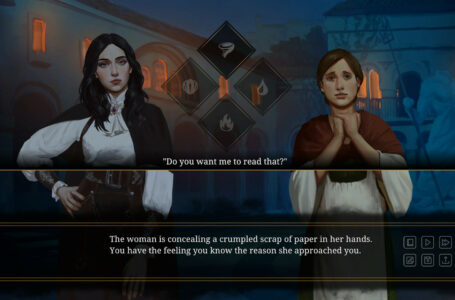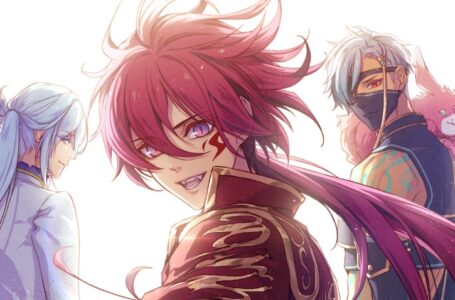Deconstructing visual novel romances with Red Embrace: Hollywood
Red Embrace: Hollywood is an OELVN (Original English Language Visual Novel) I have wanted to play for a while now, and I could not pass on it when it was on sale earlier this year. It has seen a mostly positive response on Steam’s reviews, sitting at 84% positive at the time of writing this, but its quite noticeable and vocal criticisms had me even more curious of what the game had to offer.
I have spent quite a number of hours on Red Embrace: Hollywood now — more than I dare to admit at this point — but the guilty pleasure I have felt from actually finding so much enjoyment from a vampire visual novel is something I have found thoroughly refreshing. I loved it — so here are my extensive thoughts as to why I think more should be appreciative of what it has to say.
Romance is dead, and so are you
Let’s establish what the basic setup of this game is so you know what to expect, then we can get deeper into why it’s so impressive — and how it breaks the mould.
The player has a fully customisable main character to project themselves onto. The ability to choose your pronouns, appearance and name makes for easy immersion and player insertion — it’s one best opportunities to customise your main character that I’ve seen within the genre, and it is further enhanced with all the choices you make in a single playthrough. You end up feeling that the main character really is your own stand-in — with most of your decisions affecting three character parameters. But more on that later.
Red Embrace: Hollywood’s story follows the main character as they are caught in the midst of a civil war brewing in the underground of Hollywood, where three vampiric Houses are subtly or ruthlessly stoking the flames of absolute carnage. Because if there’s one thing vampires are good at in this universe, it’s ruffling each other’s feathers.
The three Houses consist of the rambunctious and wild Mavvar; the human-like Iscari; and the suspicious, unpredictable Golgotha.
The game begins with players getting accidently bitten when they are incorrectly targeted at the request of a certain house. Now having to accept your fate as a walking dead person, the issues that come with an unwanted and sudden change in lifestyle are never-ending: a craving for blood that raises frequent moral dilemmas; a looming sense of broken freedom along with a loss of direction and purpose; and being thrown in the deep end, having to accept the guidance from one of three possible mentors to get accustomed to vampire life.
Make what you can of the bleak situation, but the end result is no different: it’s all downhill from here.
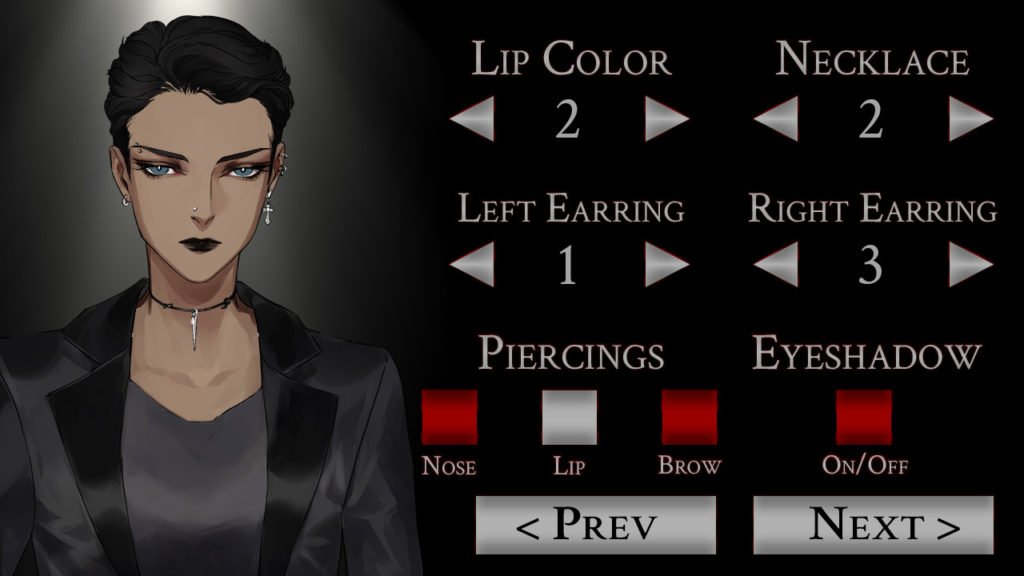
Red Embrace: Hollywood deserves major kudos for breaking the norms of the genre: it’s a rare example of a visual novel that does not focus on romantic aspects, despite relationships being a key contributor to the decisions you make.
The overall story takes precedence over the romancing: you’ll need to choose who to stab in the back and who to ultimately support as your chosen victors of a war for the underworld. The game knows what its players are seeking, and each part of its design is a reflection of the player’s real wants.
But there in itself is the catch: the game decides to go the extra mile in challenging players by emphasising questions that trample the expectations and self-satisfying wants for romance-centric games. It even goes so far as to sneak a few details into the background of illustrations if “fake loves” make us happy.
The message from the game is clear: we’re heading for a depressing destination, and that is apparent from the get-go. Because despite our affinity and affection for the game’s loveable characters — 90% of them deserve much better than the situations in which they find themselves — most of them never consider the main character’s wants. They’ve simply got too much of their own baggage to overcome before even considering pleasing someone else.
But that’s not even the worst part. The warning signs are there from the start, but inevitably most players will turn a blind eye to it — because that’s not what we think we want. But does the game ever listen to our needs? Of course not.
The Vampire motif going back to its horror based roots
Red Embrace: Hollywood is a very dark story, especially with regard to how it treats the player. If there’s one major compliment I want to immediately give to Red Embrace: Hollywood, it is in how plausibly it presents and explores the concept romance with a vampire, and what it would truly entail. Everyone is doomed from the very beginning, with no light at the end of the tunnel.
With the game set back in 1996 Los Angeles, the game frequently challenges a number of core themes: most notably illusion and idealism. Los Angeles is seen even to this day as the embodiment of the American Dream — a place where where people find a new beginning with revigorated hope for fame, wealth and prosperity — but here, it’s constantly seen through the gloomy, broken lens of our main character’s perception; their hope for such a future has been dashed, after all.
The setup is dark and broody on its own, but the introduction of its most troubled souls as the love interests is where the tension builds tenfold; the tragedy continues to increase with each new chapter as our world view is widened.

The glamorous fantasy of Hollywood is pure fiction compared to the reality presented here. This importantly ties in with to what the game has to say about the concept of vampires, with it going against the norms — it instead offers a different approach as an exploration of how idealism can hurt us.
For decades now, vampires have been romanticised in the mainstream. We’ve seen it in literature, video games, television — you name it, you can probably rattle off plenty of examples without even thinking about it too hard.
But with that escalation in appeal, what was once a well-known horror figure seems to have lost a lot of its core evilness and darkness. Vampires have been popularised in modern times through the likes of the Twilight series, and further back with the heavily romanticised, star-crossed lovers element of Buffy the Vampire Slayer. Predating even those examples are, of course, works like the novels of Anne Rice — and even elements of Bram Stoker’s Dracula.
Peak “evil vampire” over the years came in the form of silent movie-era Nosferatu, and in the 1819 novel The Vampyre, possibly one of the earliest works to include these nightmare creatures. Nosferatu’s design was that of a villain, with his mind control powers taking hold of his victims, while The Vampyre’s titular monster had charisma so formidable he could outplay every human being he came into contact with for his own benefit.
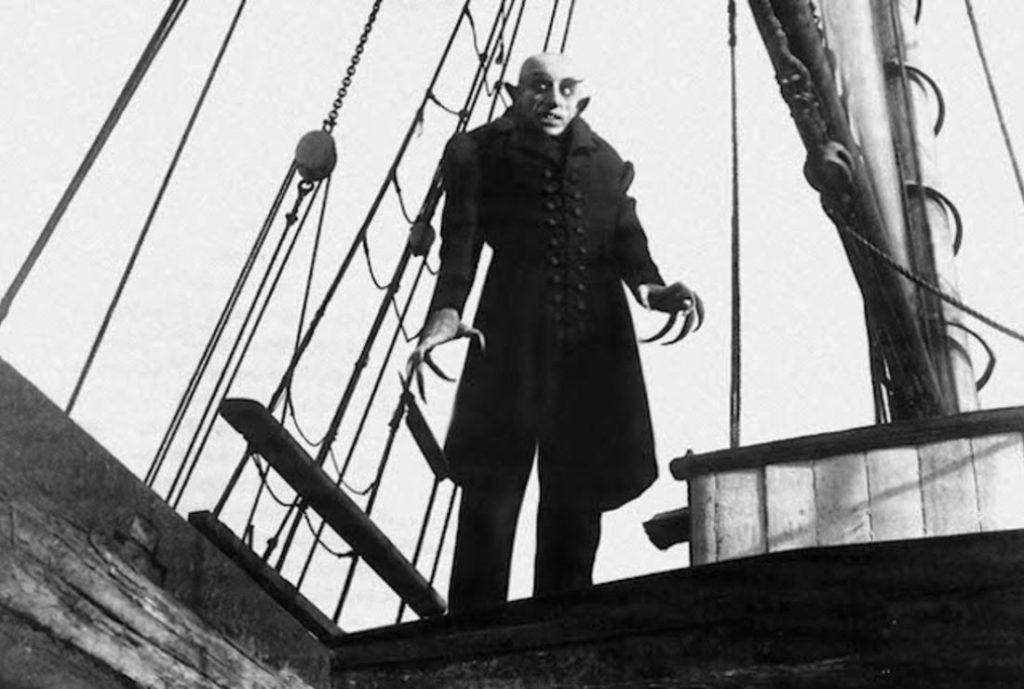
Red Embrace: Hollywood intends to ground its Vampire motif in a balance of realism and romanticisation. Judith Wilt suggests that the romanticisation of the once feared creature began as soon as they were given emotions, sensitivity, and a consistent sense of humanity. They became relatable, idealised, and appealing in all the ways you could expect nowadays, and what Argent Games’ title explores is the idea of vampires being considerably less than the perfect, flawless, and alluring creatures of the night that humans have come to idealise and chase after without a care in the world.
The game manages to balance this out wonderfully with various unique characteristics that bring out the humanity of its vampire characters, and plays on particular tropes while deviating from how they normally pan out. The simmering tension of a possible all-out war and uprising from the opposing Houses indicates a prevailing theme of instinct vs rationality, which is exacerbated by the animal instinct often triggered by their vampire blood and House traits.
However, while these vampires may clearly behave and think differently to humans, they still suffer from the same, very real and relatable issues — with each being grounded in their past lives as humans, or for their mistakes made across countless amounts of years.
At their very core, Red Embrace: Hollywood’s vampires are struggling to discover what it means to be in between life and death, wandering forevermore to discover a fragment of their past selves and successes, and seeking fulfilment in a life that can barely be called “living” anymore. In this way, Red Embrace: Hollywood criticises the sought after appeal of a vampire lifestyle, as well as exploring concepts such as celebrity culture and the price of fame in the love interests’ development.
Each love interest’s storyline encompasses a different example of what fame can bring to a person — and what it can do to them. Heath is stuck in the past, wanting and wishing for the return of the good old, brightly lit days, while Randal is currently experiencing what popularity does to a single person surrounded by “yes men” and a beehive mentality; his popularity increases with each passing day, but so too does the feeling of pressure that comes with conforming continuously. And then there’s Markus, who is at his highest point of such a “career”, as he’s the talk of the underground — truly infamous.
This all ties in with how Red Embrace: Hollywood deviates from another common depiction of vampires. In many other mainstream works, they represent youthfulness, beauty and freedom, but in Red Embrace: Hollywood, they embody the ugliness of what lingers beneath the surface.
Players are thus forced to face a very real depiction of what life would be like as a vampire, where the seeming glamour of eternal youth and immortality has arguably more disadvantages than benefits.
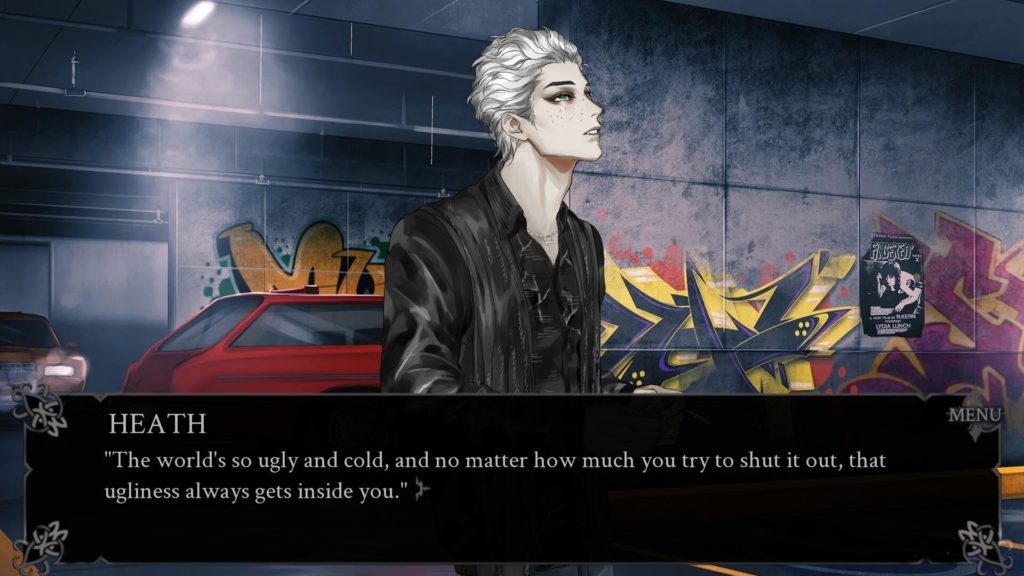
For example, each House’s attributes are just one side of a human’s most innate and primal of desires, dialled up to the extreme.
The Mavvar have an intense desire to belong — so much so that they are struck by deep, alienating loneliness if they are not surrounded by a clan. But on the flipside, their intense moblike mindset that makes them think as a hive is detrimental to their individuality.
The Iscari are the most beautiful of the vampires, but also the most damaged. Their failure in achieving their aspirations of being “perfect” frequently leads those craving humanity the most to end up turning to substance abuse and self-harm as a means of coping with the reality of their situation.
And while the Golgotha are the most dangerous and misunderstood, they represent the penetrating sense of loss at the core of every vampire: they’re empty, wandering vessels, and a mere shadow of what their humanity used to be like.
Red Embrace: Hollywood explores how an immortal life in a world continuously divided by conflict leads to absolutely nowhere — there are no happy endings here. It is an extremely morbid but very understandable take on its vampiric influences, and one that is refreshing and original to say the least.
To live a life that continuously drains your humanity — and to be unable to regain that humanity — is not optional for the characters of Red Embrace Hollywood; it’s a given. And that’s why it’s such a deeply moving experience. There’s no escape from the tragedy, but is there a way to soften the blow? Of course there isn’t.
Politics are central, and romance is an optional tragedy
For a game centred around vampires, themes typical of horror-centric and macabre fiction are to be expected. Sacrifices and the worship of dark forces are of paramount importance to certain characters’ futures, but these elements are also heavily grounded in and influenced by the human ideology and psyche that they still desperately cling onto.
For example, there is a splendid amount of subtle foreshadowing that adds further depth and characterisation to each of the love interests, indicating how the traumatised characters cope through their issues. My favourite take on this is Randal’s frequent habit of doodling that goes from being quite mild to a chaotic, disturbing mess to indicate his worsening mental state.
All the game’s characters, especially the three love interests, are deeply troubled and broken individuals; everyone’s suffering has been exacerbated by living a life with no end in sight, now that they are immortal.
With all this in mind, it would be entirely understandable if players were to feel discouraged in pursuing the game’s romantic aspects, since no amount of positive reinforcement and guidance from the main character will bring these characters true happiness; that’s the stance the developers have remained steadfast in. But that’s also why it’s so good; the fact that these characters’ fates are pre-determined and that no amount of romancing can “fix” these broken souls makes their stories all the more interesting.
For example, Randal’s story explores how sometimes good intentions can be unsuccessful in achieving a goal — particularly when you’re forced to conform to the will and desires of others. Even if you share the same ideals and mindset with other people, their exhausting and desperate efforts can become overbearing and eventually destroy the leadership they craved.
Each story, despite being completely layered in tragedy, has a poignant lesson to teach, with psychological exploration of its themes on top of its appealing presentation and story-telling.

Immortality does not bring any semblance of happiness to the vampires of Red Embrace: Hollywood. Even the similarity between being dependent on drinking blood and addicted to substance abuse does not prevent some vampires from turning to actual drugs — simply as a means of feeling something other than a craving for food. Heath, for example, attempts to escape the truths of his new life in this way — while the player character is criticised for seeking the same empty goal of finding hope in a hopeless world when by his side.
This nihilistic theme is backed by the game’s constant anti-escapism messages, perhaps best highlighted by the “blood pet” element. This is an optional part of the main character’s journey, where a human NPC willingly gives themselves to the main character to serve as a continual source of sustenance; the “blood pet” in question derives pleasure from the experience, while it’s fair to say that the vampires feel no such thing.
The game is influenced heavily by Friedrich Nietzsche’s theories, and this is best explored through the character of Markus. The romance in Red Embrace: Hollywood is the opposite of what we take for granted and what we assume is the norm, and this aspect is made incredibly intriguing in the way it is presented by its most mysterious love interest.
He’s a tough one to describe. He’s a character whose frequent cryptic and philosophical musings act as constant reminders of the underbelly of the world in which the main character now lives: one full of contradictions, hard to decipher meanings and intentions, and dialogue that puts existential dread in the limelight as a focal theme of his route.
It predominantly highlights the overarching illusion of the game across all its design choices: player agency, romance in the non-traditional sense, and the juxtaposition of the glamour of the Hollywood lifestyle and romanticism of vampires. They are not humans anymore. They cannot experience love in the same we can, and how they might be able to feel intimacy and a connection with others is even more challenging when they’re walking corpses.
Red Embrace: Hollywood is not a dating sim, but a tale about the intricacies and tragedy of violence and mindless war when unity is the most desirable and best outcome. But it can never be acted upon. It’s a deep and unforgiving experience with a mature storyline that stars vampire characters with relatable, human struggles that are fleshed out and focused on over the vampire motif to create something truly organic and unique.
Even its player character continues to suffer through the illusion of agency and control via all the choices that end up affecting the wider world events and society around them — and not necessarily the romantic relationship with their chosen love interest.
All 17 of the game’s endings come about as a consequence of your choices in the overarching story, and not as a result of your relationships with the love interests. Your choices that affect your reputation levels with the three Houses are the only real influential decisions to be made.
These endings often go completely against story beats we’ve come to expect for the genre. They’re often cruel, but the significance of the player being in the role of the main character and having the opportunity to make so many world-changing choices makes the relationships with those around them all the more important and emotional. The characters’ fates are, shockingly, out of our hands and often doomed right from the start.
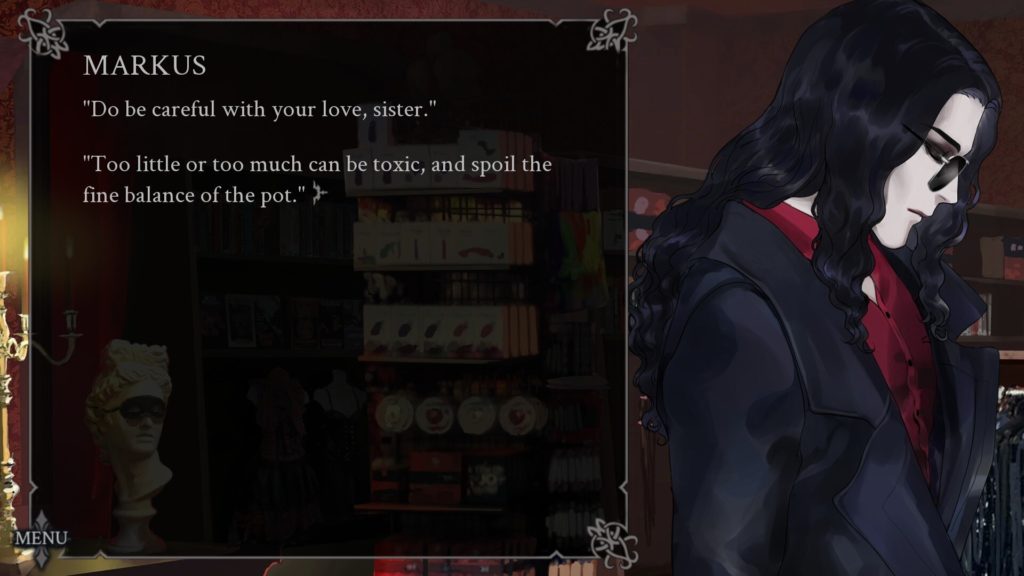
The game tackles many other aspects of romance in games through the depiction of their vampiric elements, such as emotional intimacy being of greater importance than physical intimacy. It’s hinted throughout the routes that bedding the love interests would be a massive mistake, since the main character cannot save them, and we see a number of highly uncomfortable, unpleasant displays of love that the characters are simply not able to accept at the current time and in their present situation.
To put it another way, love is a challenge for players to pursue, rather than being the primary goal as in the vast majority of other visual novels out there.
And yet, there is a prevailing motivation for each character seeking love — and inevitably turning to damaging themselves to cope instead. There is a sense of nihilism across all the characters, since they are either humans seeking meaningless fame that hurts them in the long run, or vampires stuck with the cost of finding such popularity, now doomed to fight an endless, empty war. It’s a desperate struggle of back-and-forth that you won’t be able to look away from.
One of the most disturbing player insertion experiences
Red Embrace: Hollywood looks at the complexity of humans, and never fails to present everyone as being both good and bad. Each character is morally grey, so much so that it is evidently represented in its very own main character. Our player character has three parameters that are affected depending on how you communicate with every Hollywood dweller in the game: your morality, your personality, and your attitude.
In the aforementioned “blood pet” sequence, for example, the game asks its player what the morally correct reaction would be when having to face a mistake you’ve made — in this case, having bitten a human during the common route. Is it to endorse the victim whose life you have changed forever from a single choice that was out of your hands and give them what they seemingly want, or is it to allow them to find a new reason to live? We’ll never know, and that’s the scariest part.
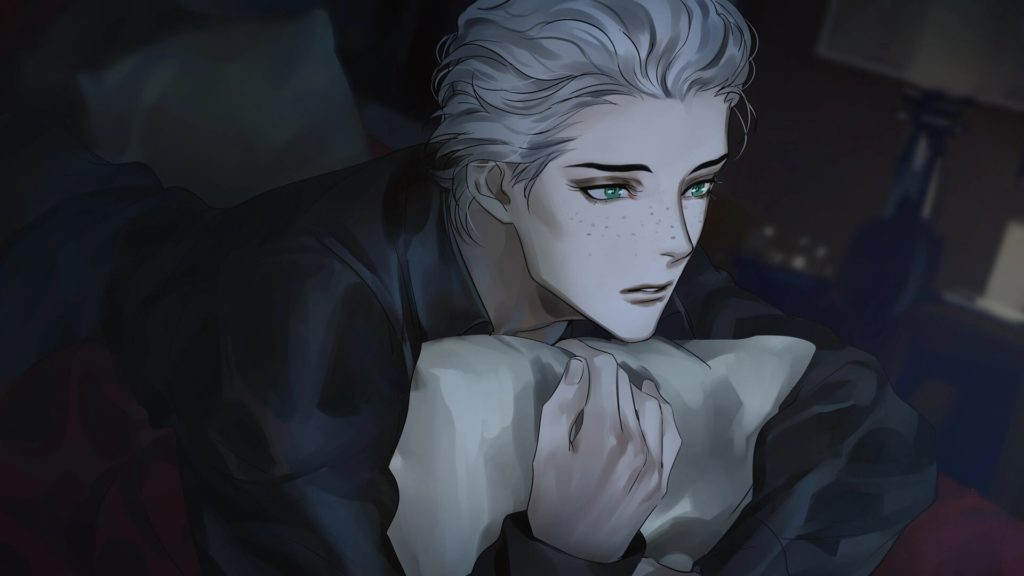
Now here’s probably the biggest punch. The game not only makes us question various parts of our own personality by making us side with and betray the three Houses across a playthrough, but also places the main character in various circumstances that will actively and genuinely hurt the love interests.
Many of these examples are out of the player’s hands and presented as plot points without player interaction, but that just makes the opportunities you have to make a choice that really hurts someone all the more disturbing.
For example, in Heath’s case, his former existence was satisfied by being seen, adored and recognised for his idol status. Even since turning into a vampire, he still seeks that past life, despite being empty and hollow — and if you indulge his fantasies, your praise and endorsements only ever poison him all the more, dooming him to never be able to accept his own existence. Ultimately, the main character is a constant reminder of his better days and his “ideal” existence — and it pushes him right to the brink of no return.
The same can be said for Randal, who, despite finding comfort for possibly the very first time in his long, lonely life by pursuing a relationship with the main, recognises during his own route that focusing on them was the last thing he should have done. Doing so leads him astray by causing him to put too much focus on the main character’s wellbeing over and above his need to deal with his own demons.
Comparatively, Markus may be the most positive in both character and outcome, with one of his endings even offering a somewhat hopeful conclusion. Of the entire cast and out of all the other depressing, bittersweet endings — and the special endings of both Heath and Randal that are true nightmare fuel — Markus is the only real beacon of hope in a world almost completely overcome by nihilism.
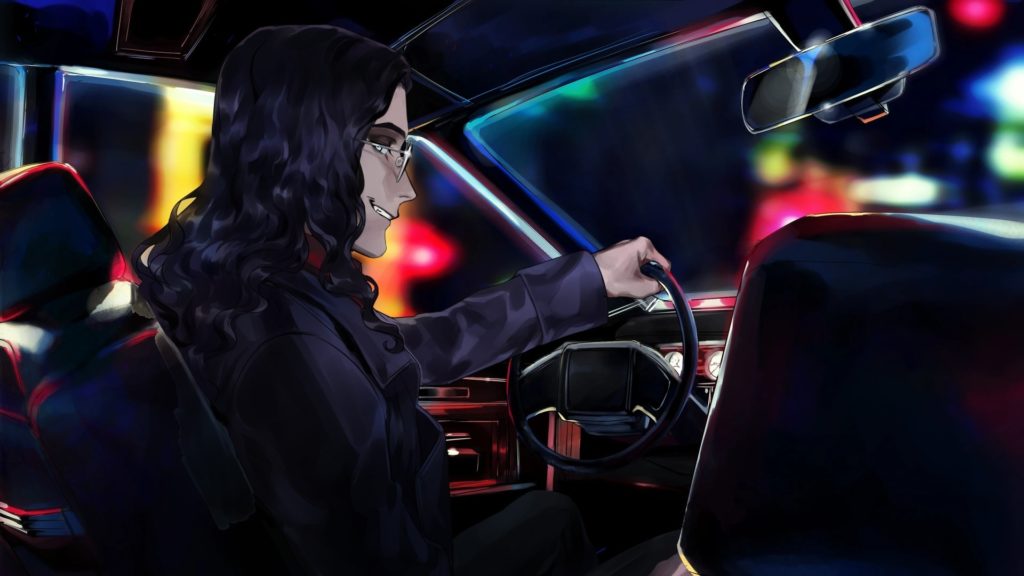
Markus is probably the only love interest to have truly come to terms with his state as a vampire, and his life as the oldest and wisest of all the love interests. This makes his guidance for the main character the most revealing and helpful in the long run — which makes sense when his route can be regarded as the “true” one in some ways.
It should hopefully be clear by now that Red Embrace: Hollywood is surprisingly complex. And it’s not just the love interests who will surprise you; a great example is Saorise, a once stoic leader who takes you under her wing.
She occasionally lets her hardened exterior soften and her mask slip, depending on your closeness to her. She has very human reactions despite clearly making an effort to establish herself as a headstrong individual aiming for absolute control and authority. She happens to be one of only a handful of other characters not plotting to overthrow the others and send the world into anarchy — and is actually so anti-violence that she grows visibly concerned for the world’s future as an uprising seems more and more likely.
She puts on a brave face for her House, but has her own that sometimes drift up to the surface, if you choose to take notice of her and her own concerns.
In the end, the game offers nearly no happy endings no matter who you align with or betray, and instead plays out completely subjectively. The things players could possibly perceive as positive are extremely limited and vaguely suggested; it’s all in what you make of it.
Addressing the major gripe
In what I can only take with a grain of salt, since the developer’s commentary book is no longer being sold via Steam or itch.io, players have provided snapshots of what the developers had to say about the title, and one sentence in particular made it clear why response to the game has been quite critical in places: “Red Embrace: Hollywood grew from those fears as a last-ditch effort, and it started from spite.”
So about that. Argent Games were branching out from their prior establishment as a BL visual novel developer with Red Embrace: Hollywood, and this desire to grow and change seems to have influenced the more uncomfortable scenes, its self-deprecating dialogue, themes that criticise the player — and a sense that unhappy endings are attempting to teach the player a lesson.
But if this really is the truth, I don’t think it damaged the product. If anything, it actually does something new and daring with the labels it was selling itself as — but it’s also understandable that those coming in expecting one thing and finding another would be upset.
Red Embrace: Hollywood is predominantly an adventure game that covers themes such as identity, belonging, otherings, cult, religion, and violence, and has the relationship aspect as a sidepiece which quite possibly was just to appease players. The developers of Argent Games have said they always had the motive of creating visual novels that are not intended to be sold for explicit content. Instead, they focus on the complexity of emotions, love and life, and want to make games that explore such topics in a realistic way. It goes without saying that they absolutely delivered such intentions with the game then.
Despite it being both labelled and marketed as an otome, it has a consistent theme of actually being something of an “anti-otome”. Whilst the game does most certainly contain routes based on romantic interests, it’s hard to dispute the fact that the game does critique the very defining traits of the genre it supposedly occupies, featuring vampire love interests who are forever doomed — and pretty much all “bad” endings.
While endings that never hit a happy note are one thing, the consistently uncomfortable sexual scenes are an entirely different subject. None are intended to be idealised in the slightest: one depicts a clearly asexual individual partaking in the activity purely to satisfy the main character; another features a love interest clearly influenced by drugs to cloud his better judgement and wants; another even provides the opportunity to commit outright sexual assault.
In this way, it’s been the game to fill a void while I wait for other titles I’d love to see come west — games like Club Suicide. Both titles were intended as anti-otome games, and it’s understandable that if the marketing says the exact opposite of what the end product ends up being, players have the right to be disappointed.
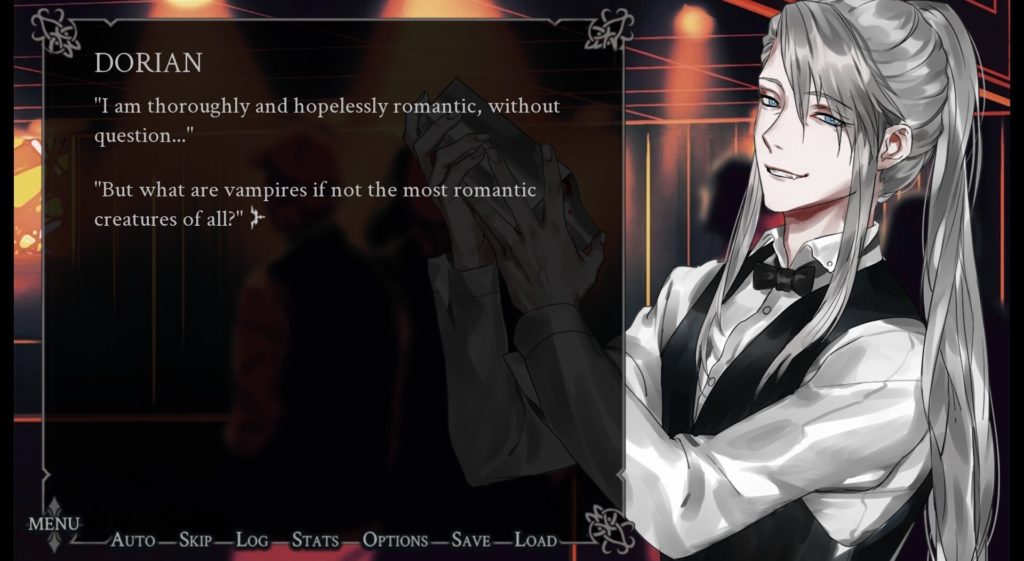
But you should also be open-minded; Red Embrace: Hollywood is so much more than that. It’s refreshing and daring for an OELVN to show the true horror of what a vampiric lifestyle would entail, along with the overwhelming nihilism of such a dark and bleak setting — along with the false love and fake trust that comes from such a nightmare of a world in which people have lost the very things that make them themselves.
What’s in it for the player?
So it begs the question: should a game prioritise making us feel good, or is there something else to appreciate from it? In the case of Red Embrace: Hollywood, the creators’ intentions with said product is obvious: it’s here to tell a story first and foremost. A story that tries to show the legitimately depressing and horrifying side to the vampire legend — and which aims to critique the very genre it is basing itself on.
The game understands that having relationships with its love interests as they currently are is not healthy, nor should it be encouraged or condoned. It’s ultimately up to the player what they think the right approach is if they want to make things right, but that also highlights how conditioned we have been within the genre itself: it’s easy to assume that merely falling in love will solve the love interests’ problems, and for once, that’s not actually correct here.
The fourth wall is broken multiple times to poke fun at the setup and its own genre, such as by questioning the player’s reasoning for why they are playing a game when the protagonist is in such persistent peril — and why they would be chasing romantic interests who are to not be trusted. The game is a realistic take on a supernatural theme that has been romanticised for decades now, instead having its characters blatantly ridicule the very idea of drinking blood from a person’s neck creates an unbreakable bond. That’s fantasy, and Hollywood just masks the truth of it all instead.
As long as you go into the game knowing all this up front, you’ll be well prepared to know the type of angst you’ll be going head first into. Red Embrace: Hollywood ultimately deserves your attention, and you can buy it on either Steam or itch.io. And with 40 hours to clear all the endings and see the grand finale, there’s certainly plenty to explore here — and it will most certainly strike you in your very core, for better or for worse.
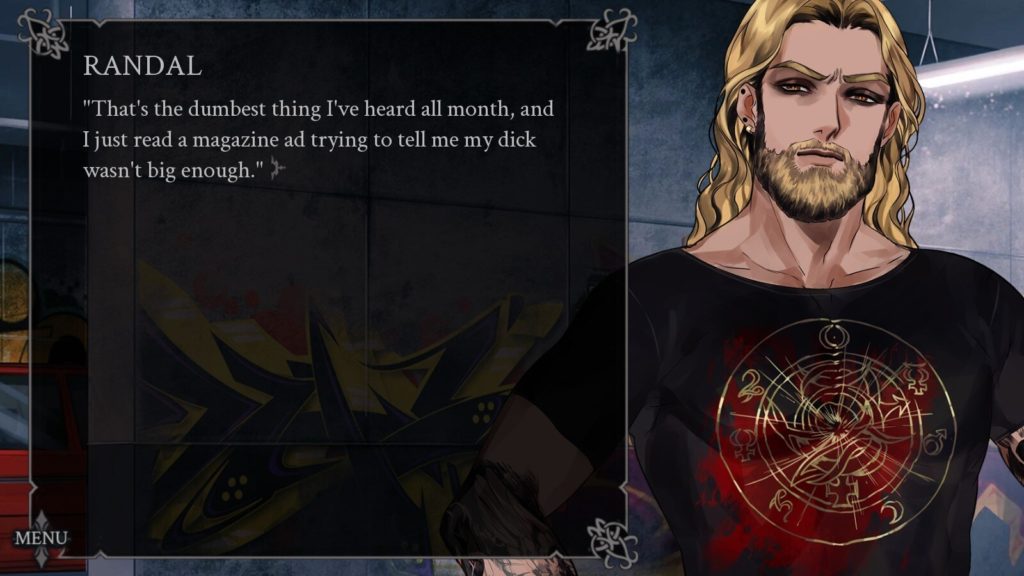
For the price that you’re paying, you get so much narrative material to discover at your leisure, since almost every single NPC has their own story to tell if you put the time and effort into pulling at that narrative thread.
It’s been a truly eye-opening experience, depicting the woes of those aiming for the stars, and the consequences that come when seeking even a sliver of hope and power in a world so against you. No one wins in war; humanity and life as we know it has a idealistic outer layer that hides the ugly depravity behind it; and Red Embrace: Hollywood plays out as a reminder of the futility of life itself.
It’s all too real, and seeing a video game as ruthlessly unforgiving as this depict it in such a surprisingly nuanced and delicate way is ground-breaking. In a doomed world, no amount of escapism will save us — and that’s a fascinating concept to explore, even if it’s pain inducing and frequently starts up the waterworks.
Or maybe I’m more of a masochist than I first thought? That could be a simple explanation for my love for it.
Red Embrace: Hollywood is available now on Steam and Itch.
Join The Discussion
Rice Digital Discord
Rice Digital Twitter
Rice Digital Facebook
Or write us a letter for the Rice Digital Friday Letters Page by clicking here!
Disclosure: Some links in this article may be affiliate links, which means we may earn a small commission if you make a purchase after clicking on them. This is at no additional cost to you and helps support Rice Digital!
- Sigh of the Abyss: Shadow Bonds – Prologue Review - October 7, 2023
- Is She The Wolf? is wickedly addicting TV - October 6, 2023
- The steady consumption of Slow Damage - October 5, 2023





